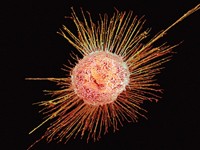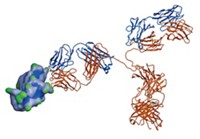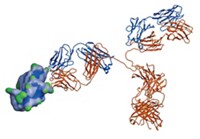Advertisement
Grab your lab coat. Let's get started
Welcome!
Welcome!
Create an account below to get 6 C&EN articles per month, receive newsletters and more - all free.
It seems this is your first time logging in online. Please enter the following information to continue.
As an ACS member you automatically get access to this site. All we need is few more details to create your reading experience.
Not you? Sign in with a different account.
Not you? Sign in with a different account.
ERROR 1
ERROR 1
ERROR 2
ERROR 2
ERROR 2
ERROR 2
ERROR 2
Password and Confirm password must match.
If you have an ACS member number, please enter it here so we can link this account to your membership. (optional)
ERROR 2
ACS values your privacy. By submitting your information, you are gaining access to C&EN and subscribing to our weekly newsletter. We use the information you provide to make your reading experience better, and we will never sell your data to third party members.
Biological Chemistry
Nobel Prize In Physiology Or Medicine
Awards: Three researchers share prize for breakthrough work on immunity
by Sarah Everts
October 10, 2011
| A version of this story appeared in
Volume 89, Issue 41
For their pioneering work in innate and adaptive immunity, Bruce A. Beutler, Jules A. Hoffmann, and the late Ralph M. Steinman were awarded the 2011 Nobel Prize in Physiology or Medicine. These fields of research have revealed how our bodies detect, fight, and remember invading pathogens.

Hours after the foundation announced that one-half of the prize would go to Steinman, a Rockefeller University immunologist, the university’s president contacted the foundation to say that Steinman had passed away just three days prior, at age 68.
After some deliberation, the Nobel Foundation decided that Steinman will remain a laureate, despite foundation rules barring posthumous prizes.
The three prizewinners’ research “has opened up new avenues for the development of prevention and therapy against infections, cancer, and inflammatory diseases,” notes the Nobel Prize announcement.
Hoffmann and Beutler will each receive one-quarter of the roughly $1.5 million for their work in the 1990s on innate immunity, which is the body’s first line of defense against invading pathogens.
Hoffmann, 70, of France’s National Center for Scientific Research (CNRS) in Strasbourg, discovered that fruit flies that lacked the gene for a receptor protein called Toll died during bacterial and fungal invasions.
It turns out that the Toll receptor is a fruit fly’s first line of defense against foreign invaders; Toll’s activation leads to the destruction of the pathogen and the triggering of an inflammation response that further blocks microbial attack.
Two years after Hoffmann’s 1996 discovery of Toll, Beutler, 53, currently a geneticist at the University of Texas Southwestern Medical Center and the Scripps Research Institute, discovered the fruit fly receptor’s equivalent in mice, which he named Toll-like receptor.
These two receptors “were the tip of the iceberg,” says Felix Randow, who studies innate immunity at MRC Laboratory of Molecular Biology in Cambridge, England. With Toll and Toll-like receptor in hand, researchers soon managed to identify other components of the innate immunity network, he adds.
Steinman is one of the prizewinners for his discovery of the role dendritic cells play in adaptive immunity, the body’s second line of defense against invading pathogens.
After the initial detection of foreign invaders by the Toll or Toll-like receptors, dendritic cells process the danger signals from these receptors and then instruct other immune cells called T cells to fight infection and develop a memory of the invading pathogen, says Alexander G. Betz, who studies adaptive immunity at MRC Laboratory of Molecular Biology.
When he first heard Steinman had won the prize, Andreas Pichlmair, immunologist at the Max Planck Institute for Biochemistry in Martinsried, Germany, says he felt “more than happy.”
“I knew that Ralph Steinman was very sick, and therefore I was happy he got the prize in time. Apparently not. It’s very sad,” he adds.








Join the conversation
Contact the reporter
Submit a Letter to the Editor for publication
Engage with us on Twitter